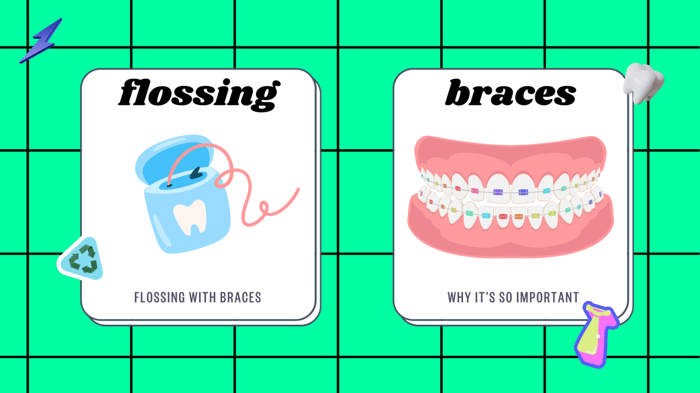We all know that flossing is good for our teeth... but did you know that flossing impacts more than just your oral health? It's true! Flossing plays a big role in keeping your overall body healthy as well! In fact, research indicates there is a link between flossing and heart health - showing that regular flossing can play a crucial role in helping to keep your heart healthy.
This is because the bacteria that forms at your gum line or in between your teeth (the the stuff you floss away) not only can cause gum disease, but can also enter the bloodstream, causing inflammation in the heart's arteries. So, flossing not only helps to keep your mouth clean and gives you good oral health, but it also protects your heart. Hence, regular flossing could be your first simple step toward healthier living.
Research suggests that maintaining good oral hygiene, including regular flossing, is associated with a reduced risk of certain heart conditions. Establishing a consistent flossing routine as part of your oral care regimen may contribute to overall cardiovascular health.
The Link Between Flossing and Heart Health
As we mentioned, flossing isn't just about keeping your gums healthy and teeth sparkling; it's also about taking care of your heart. This means that paying attention to your gums could actually be a key part of looking after your heart too. It's like a chain reaction: good oral hygiene protects against gum disease, which in turn lowers the risk of inflammation in the heart.
According to studies, having untreated gum disease can make you more likely to develop heart disease than if you don't have gum disease. This doesn't mean that gum disease causes heart disease directly, but rather that there's a connection between them.
Think of it this way: neglecting oral care isn't just damaging to your teeth; it could also be impacting the health of your entire body.
Imagine being at the beach and spotting storm clouds on the horizon. You might not see raindrops falling yet, but you know a storm is coming. Similarly, while gum disease may not directly cause heart issues, it could be an early warning sign that you are at risk for further health issues.
So, now you know why flossing regularly is so important. It prevents bacteria from building up between your teeth and along the gum line, reducing the chance that the bacteria find its way into your bloodstream and sets off trouble in other parts of your body.
Understanding this link opens up new horizons in safeguarding our health where good oral care benefits extend beyond a beautiful smile.
Research Evidence Supporting Heart Health and Flossing
The scientific community has long been invested in understanding the intricate relationship between oral health and overall well-being. A study published in the Journal of Periodontology made a striking discovery: individuals who consistently engaged in regular flossing saw a remarkable 40% reduction in their risk of cardiovascular disease. This significant finding not only highlights the untold influence of periodontal health on heart health but also serves as a compelling testament to the impact of maintaining good oral hygiene practices on our overall wellness.
It's vital to note that gum health plays a pivotal role in this intricate association. When gum disease is present, it can trigger an inflammatory response in the body. This chronic inflammation has been linked to an increased risk of heart disease and other systemic conditions. Essentially, poor oral hygiene can serve as a silent instigator, laying the groundwork for potential cardiovascular issues in the future.
Consider this: Each time you pick up that piece of floss, you're not just taking care of your teeth and gums; you're actively safeguarding your heart as well. It's a small act that carries significant ripple effects for your overall health.
This groundbreaking result underscores the importance of integrating flossing into our daily routines—transforming it from a mundane task into a proactive step to fortify our entire cardiovascular system. The diligent prevention of gum disease through regular flossing offers tangible benefits beyond simply maintaining fresh breath and healthy gums.
To put it into perspective, think of floss as a superhero cape for your heart. Its regular use acts as an invisible shield protecting you from potential harm, highlighting how minor yet consistent actions can yield substantial long-term benefits.
Exploring this profound connection reveals that our oral habits extend far beyond mere dental hygiene, exerting an influential impact on broader health outcomes.
Bacteria Levels and Heart Disease
Bacteria may be tiny, but they can cause big trouble. When we don't floss regularly—especially if we have periodontal (gum) disease—the harmful bacteria that live in our mouth can get into our bloodstream. From there, they can cause inflammation in our arteries - which then are more likely to become narrower, restricting blood flow and can lead to more serious heart health problems like heart attacks and strokes.
Flossing to the Rescue
Flossing regularly helps reduce this bacterial load, preventing them from finding their way to places they shouldn't be and potentially causing harm.
Bacteria in the mouth are much like any other living organism; they need food to grow! When we don't floss, we allow food particles to remain trapped between our teeth. These particles then serve as food for bacteria, allowing them to multiply rapidly and create plaque. Plaque is a sticky substance made of germs that form on our teeth. It's pretty sneaky too; even when brushing, it's not easy to remove all of it.
Imagine plaque like an unwanted guest at a party - it sticks around, causes trouble, and doesn't leave easily! That's why flossing is so important; it's like evicting these unwanted guests before they overstay their welcome.
It's now clear that maintaining low bacterial levels through regular flossing doesn't just prevent dental issues; it also has a significant impact on reducing inflammation in the arteries and minimizing the risk of cardiovascular complications down the line.
How Flossing Strengthens the Heart
Think of it this way: when you brush your teeth, you clean the surfaces that are easy to see. But what about those hard-to-reach spots where food and bacteria like to hide? That's where flossing comes in. It helps get rid of the stuff that could otherwise cause trouble.
Maintaining good oral hygiene is like strengthening the soldiers that help guard your health. By keeping your gums free from inflammation and infection, you reduce the risk of harmful bacteria entering your bloodstream. This, in turn, lowers the chances of causing damage to your heart and blood vessels.
Now, I know what some people might be thinking: Does something as simple as flossing really have an impact on heart health? Well, think about it this way—imagine a small leak in a dam. It may start off small, but over time the pressure builds and cracks begin to form. The same can be said for bacteria accumulation in the gums; it starts off small, but over time, if left untreated, it can lead to serious health issues.
The American Dental Association also recognizes that good oral health habits, including regular flossing, can potentially contribute to a healthier heart. It's all interconnected: healthy gums mean less risk of disease-causing bacteria entering the bloodstream and wreaking havoc elsewhere in the body.
Another thing to consider is that regular flossing not only removes plaque but also prevents tartar from building up in hard-to-reach areas. Tartar can harbor harmful bacteria which is detrimental to both oral and overall health. By taking care of your oral health through diligent flossing, you’re establishing a strong line of defense against potential heart disease risks.
So, while it may seem like a small act, don't underestimate the power of flossing—it contributes not only to a healthy smile but also to a healthier heart.
As we’ve delved into the unexpected relationship between flossing and heart health, let’s now shift our focus to exploring the proper techniques for maintaining impeccable oral hygiene.
The Right Way to Floss
Flossing is an essential part of maintaining good oral hygiene and it can also play a vital role in promoting heart health. But do you know how to floss the right way? Let's explore the proper technique for effective flossing.
The key to proper flossing lies in the gentle yet thorough movement of the floss between each tooth, ensuring that it reaches just below the gumline. This helps remove plaque and debris, preventing them from causing damage not only to your teeth and gums but also potentially contributing to heart health issues.
Imagine that your teeth are like a row of houses. To clean each house properly, you need to take a walk around the entire neighborhood, going up and down every road. In this case, the "neighborhood" is your mouth, and the floss is your trusty walking path that helps keep everything clean and in good shape.
When you floss, it's important to curve the floss around the base of each tooth. By doing so, you cover all areas—above and below the gumline—where harmful bacteria can build up and cause problems. It's like getting into all those little nooks and crannies where things can hide.
By ensuring a correct flossing technique, you are not just improving your oral hygiene; you're taking proactive steps towards optimal gum and heart health.
Now that we've explored the importance of proper flossing techniques in maintaining optimal oral and heart health, let's delve deeper into understanding how these simple habits can make a significant difference in our overall well-being.
The Consequences of Neglecting Flossing

Picture this: after a long and tiring day, you're finally getting ready to get to sleep. As you brush your teeth, thoughts of flossing fade away as your pillow looks so comfortable and welcoming. It may seem harmless, but skipping out on flossing is more than just a minor oversight. Neglecting to floss allows plaque and bacteria to take up residence between your teeth and along the gum line. This cozy habitat becomes a playground for these unwelcome guests to thrive, potentially leading to gum disease.
You see, when plaque accumulates and isn't removed by flossing, it starts to harden into tartar. Tartar, if left unaddressed, can cause irritation and inflammation of the gums, also known as gingivitis—an early stage of gum disease. But here's the kicker: if gingivitis isn’t treated promptly, it can progress into periodontitis, a more serious form of gum disease that affects the tissues and bones supporting the teeth. This isn't just about bad breath or an unsightly smile; it's about the well-being of your entire body.
This brings us to a critical point: this growing inflammation and chronic infection in your mouth can have implications beyond just your oral health. You might be surprised to learn that it can heighten the risk of harmful bacteria entering the bloodstream—a process known as bacteremia—as the barriers in your mouth become compromised due to untreated gum disease.
The potential link between gum disease and heart health is a sobering reminder that neglecting your dental health can have far-reaching effects. The consequences extend beyond tooth decay and gum discomfort; they delve into serious territory, impacting vital organs in your body.
Some may wave off flossing as just another tedious chore, but acknowledging its significance in preventing gum disease—and potential complications related to heart health—can provide a compelling incentive to make flossing a non-negotiable part of your daily routine.
Tricks to help you floss
If you're having trouble remembering to floss or are finding it difficult to do so, it might be helpful to find an alternative way to floss.
One alternative flossing option is to opt for an electric flosser, like Flaus.
Electric Flossers, like Flaus, use real dental floss and sonic vibrations to help make flossing quicker, easier and more comfortable! Electric Flossers have a long, ergonomic handle that allows you to easily floss your teeth without having to put your fingers in your mouth like you would have to with traditional floss. Flaus even allows you to do the C-shape motion when flossing.
Electric Flossers, like Flaus, are easy to use and allow you to comfortably floss your back teeth and the sonic vibrations help you to get between those tight contact spaces. The vibrations also help to stimulate your gums (think a nice, relaxing massage for your gums) and help to disrupt the biofilm and plaque between your teeth.
Electric Flossers, like Flaus, also allow those with dexterity impairments or disabilities to floss easier than traditional floss. Eight out of ten Flaus customers also report flossing more regularly after buying Flaus.
We know that when it comes to your health, consistency is key. So, if you're having a hard time consistently flossing a tool like Flaus might be for you!
Alternative Oral Health Practices That Benefit Heart Health
In addition to flossing, several other oral health practices can help keep your teeth and gums healthy while potentially benefiting your heart health. Let's explore these practices and understand how they work together to contribute to a healthier mouth and body overall.
Regular Brushing with Fluoride Toothpaste: This might seem like an obvious one, but regular brushing with fluoride toothpaste is crucial for maintaining good oral health. Fluoride helps to prevent tooth decay by strengthening the enamel on your teeth. It works by remineralizing areas of teeth that have been damaged by acid produced by bacteria in the mouth. Additionally, a healthy mouth leads to a reduced risk of gum disease and associated inflammation, which could benefit heart health.
Using Antimicrobial Mouthwash: Mouthwashes containing antimicrobial agents can help reduce the amount of bacteria in your mouth, reducing plaque and gingivitis. Some studies suggest a link between gum disease and heart disease, therefore taking steps to minimize bacterial build-up in your mouth may have broader implications on overall health. While mouthwash should not replace regular brushing and flossing, it can be a helpful addition to your oral care routine.
Regular Dental Check-ups: Attending regular dental check-ups allows your dentist to monitor your oral health closely. They can catch potential issues early, such as gum disease or cavities, making treatment easier and more effective. Furthermore, professional dental cleanings can remove plaque and tartar buildup that regular brushing and flossing may miss, which is essential for long-term gum health. In fact, research has suggested that people who get their teeth professionally cleaned have lower rates of heart attack and stroke compared to those who don't visit the dentist regularly.
By incorporating these complementary oral health practices with regular flossing, you're not only safeguarding your oral health but also potentially benefiting your overall well-being—keeping your smile bright while nurturing a healthy heart!
Ensuring good oral hygiene doesn't just benefit your smile—it could positively impact your heart health too. It’s clear that the connection between oral health and overall well-being is more significant than many people realize. So, why not take steps to improve both at the same time?
How does flossing affect cardiovascular health?
Flossing plays a significant role in maintaining cardiovascular health. Studies have shown that gum disease, which can be prevented by regular flossing, is linked to an increased risk of heart disease. In fact, a 2019 study published in the European Journal of Preventive Cardiology found that individuals with gum disease had a 20% higher risk of developing coronary artery disease.
Can regular flossing prevent heart disease or lower the risk of cardiovascular events?
Yes, regular flossing can indeed help prevent heart disease and lower the risk of cardiovascular events. Several studies have shown a direct link between gum disease and heart health. The bacteria in the mouth that cause gum disease can enter the bloodstream and contribute to inflammation in the arteries, raising the risk of heart disease. In fact, a study published in the American Journal of Preventive Medicine found that adults who flossed regularly had a significantly lower risk of developing cardiovascular disease compared to those who didn't floss. So, taking a few minutes each day to floss can be a simple yet effective way to maintain your oral hygiene and potentially protect your heart.
Is there scientific evidence to support the connection between flossing and heart health?
Yes, there is scientific evidence to support the connection between flossing and heart health. Several studies have shown that maintaining good oral hygiene by regularly flossing reduces inflammation in the gums and prevents gum diseases like periodontitis. These gum diseases are linked to an increased risk of cardiovascular diseases. A 2019 study published in the Journal of Clinical Periodontology found that individuals with periodontal disease were nearly twice as likely to develop heart disease compared to those with healthy gums. Therefore, practicing regular flossing can contribute to improved heart health.
What are the potential mechanisms behind the association between flossing and a healthy heart?
The potential mechanisms behind the association between flossing and a healthy heart can be explained through the concept of inflammation. Poor oral health, including gum disease, can lead to chronic inflammation in the body, which has been linked to various heart conditions such as atherosclerosis and heart disease. By removing the plaque and bacteria that cause gum disease through regular flossing, we can reduce inflammation and potentially lower the risk of heart problems. Studies have shown that individuals with gum disease are more likely to develop heart disease, reinforcing the importance of maintaining good oral hygiene practices for overall cardiovascular health (Source: American Heart Association).
Are there any specific recommendations regarding flossing frequency for improving heart health?
Yes, regular flossing is recommended for improving heart health. While there is no specific frequency mentioned, the American Heart Association recommends practicing good oral hygiene, including daily flossing, to reduce the risk of gum disease. Studies have found that gum disease is associated with an increased risk of heart disease, so maintaining healthy gums through regular flossing can indirectly support heart health.



















